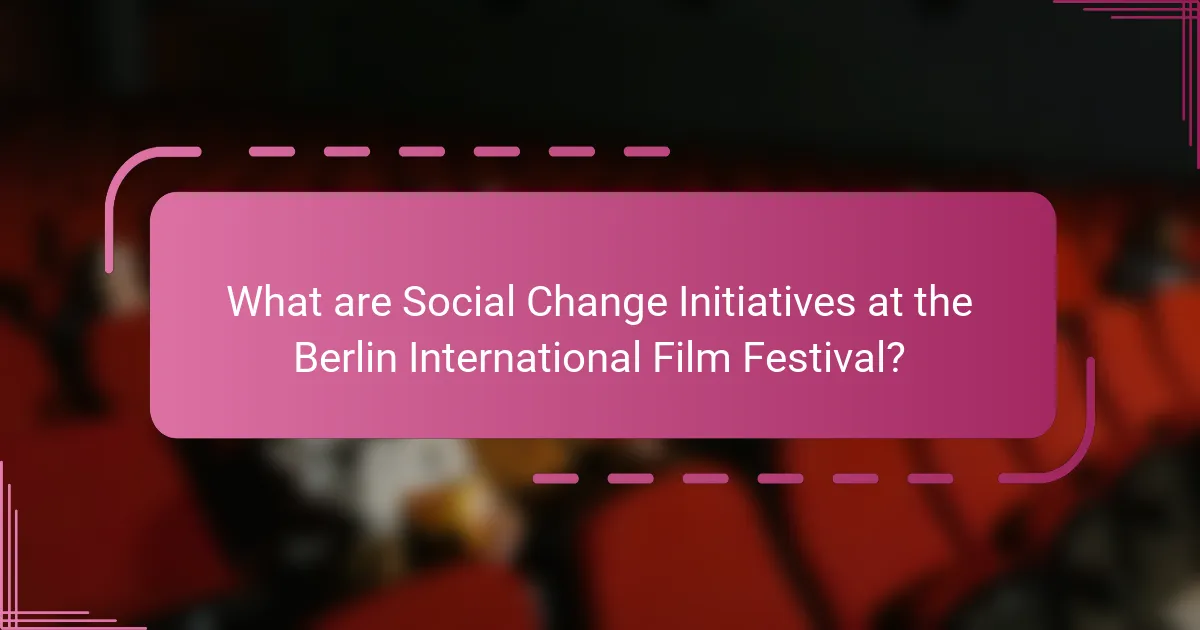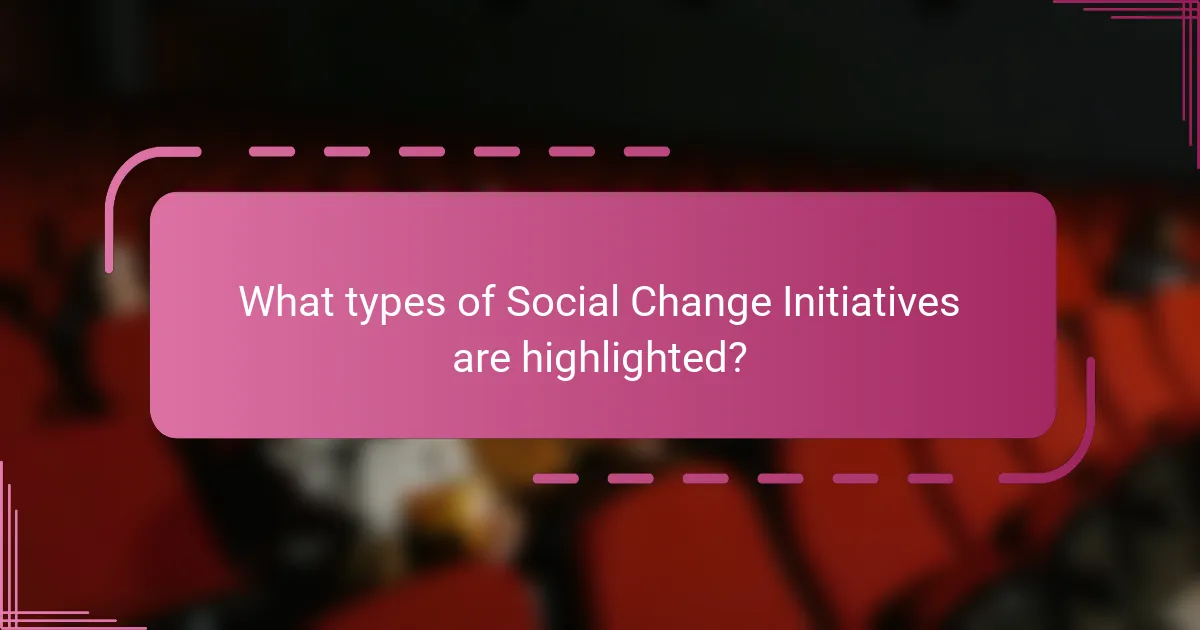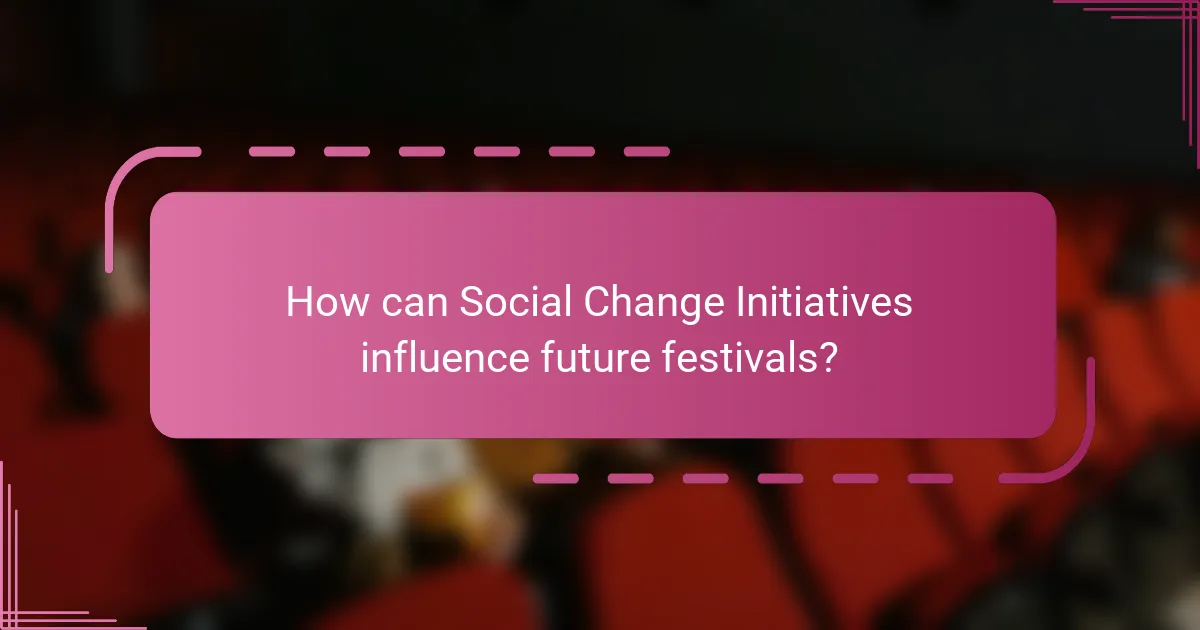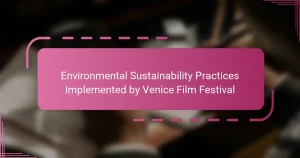The Berlin International Film Festival is a prominent cultural event that emphasizes social change initiatives aimed at promoting social justice and awareness through film. These initiatives address critical issues such as environmental sustainability, gender equality, and cultural diversity, featuring programs and events that foster discussions and workshops on these themes. By collaborating with organizations and activists, the festival amplifies important messages and encourages meaningful conversations among audiences. The focus on social change not only enhances the festival’s programming but also attracts diverse audiences and fosters community engagement, ultimately influencing the future direction of film festivals globally.

What are Social Change Initiatives at the Berlin International Film Festival?
Social change initiatives at the Berlin International Film Festival aim to promote social justice and awareness through film. These initiatives include various programs and events that focus on pressing social issues. The festival often features films that address topics like human rights, diversity, and environmental sustainability. Additionally, it provides platforms for discussions and workshops related to these themes. The festival collaborates with organizations and activists to amplify their messages. Through these efforts, the Berlin International Film Festival seeks to inspire change and engage audiences in meaningful conversations.
How do these initiatives impact society?
Social change initiatives highlighted at the Berlin International Film Festival significantly impact society by raising awareness on pressing social issues. They encourage dialogue and foster understanding among diverse communities. These initiatives often showcase films that address topics like inequality, climate change, and human rights. By doing so, they inspire audiences to take action and advocate for change. Statistics show that films with social themes can increase public engagement in activism. For example, a study found that documentaries can lead to a 30% increase in awareness of social issues among viewers. Additionally, these initiatives can influence policymakers by highlighting the need for legislative reforms. Overall, they play a crucial role in shaping societal values and promoting positive change.
What specific social issues do these initiatives address?
These initiatives address various social issues including gender equality, climate change, and mental health awareness. They aim to promote inclusivity and representation in the film industry. Additionally, they focus on raising awareness about social justice and human rights. For example, initiatives often highlight the plight of marginalized communities. They seek to empower underrepresented voices in storytelling. These efforts contribute to a broader dialogue on pressing societal challenges. The Berlin International Film Festival serves as a platform for these critical discussions.
Why is the Berlin International Film Festival a platform for social change?
The Berlin International Film Festival serves as a platform for social change by showcasing films that address critical social issues. It highlights narratives that promote awareness and understanding of diverse cultures and perspectives. The festival features documentaries and fictional works that tackle topics like human rights, environmental concerns, and inequality. Through panel discussions and Q&A sessions, filmmakers engage audiences in meaningful conversations. The festival’s commitment to social impact is evident in its selection of films that challenge societal norms. Additionally, awards like the Berlinale Talents program support emerging filmmakers with socially relevant stories. This focus on impactful storytelling fosters dialogue and inspires action among viewers and industry professionals alike.
Who are the key stakeholders involved in these initiatives?
Key stakeholders involved in social change initiatives at the Berlin International Film Festival include filmmakers, NGOs, and sponsors. Filmmakers create content that raises awareness on social issues. NGOs provide expertise and support for various causes. Sponsors contribute funding and resources to facilitate these initiatives. Additionally, audiences play a crucial role by engaging with the content and advocating for change. Each stakeholder collaborates to amplify the impact of the initiatives presented at the festival.
What roles do filmmakers play in promoting social change?
Filmmakers play a crucial role in promoting social change by raising awareness and sparking dialogue. They create narratives that highlight social issues, influencing public perception. Documentaries and feature films often address topics like inequality, climate change, and human rights. For instance, films such as “13th” by Ava DuVernay expose systemic racism in the U.S. prison system. These works can inspire audiences to take action or rethink their views. Additionally, filmmakers collaborate with activists to amplify their messages. Festivals like the Berlin International Film Festival showcase these impactful films, providing a platform for change. Such initiatives encourage discussions that can lead to policy reform and community engagement.
How do audiences contribute to the success of these initiatives?
Audiences contribute to the success of social change initiatives by engaging with the content and sharing their perspectives. Their participation amplifies the message and raises awareness of critical issues. Audiences provide feedback, which can help shape future initiatives. Their emotional responses can motivate action and inspire others to join the cause. Studies have shown that increased audience engagement leads to higher visibility and support for social issues. For instance, social media interactions can significantly expand the reach of initiatives. Ultimately, active audience involvement creates a community around the cause, fostering a collective effort for change.

What types of Social Change Initiatives are highlighted?
The types of social change initiatives highlighted include environmental sustainability, gender equality, and cultural diversity. Environmental sustainability initiatives focus on reducing carbon footprints and promoting eco-friendly practices. Gender equality initiatives aim to empower women and address issues such as pay equity and representation in media. Cultural diversity initiatives emphasize the importance of representation and inclusivity in storytelling. These initiatives reflect the festival’s commitment to using film as a platform for social change.
How are these initiatives categorized?
Social change initiatives highlighted at the Berlin International Film Festival are categorized based on their thematic focus and impact. These categories often include environmental sustainability, social justice, and cultural representation. Each initiative is assessed for its ability to raise awareness and drive action in its respective area. For example, initiatives focusing on climate change may showcase innovative solutions in filmmaking. Social justice initiatives often address issues such as inequality and human rights. Cultural representation initiatives aim to amplify marginalized voices in the film industry. This categorization helps in understanding the diverse approaches to social change presented at the festival.
What are the common themes among the initiatives?
The common themes among the initiatives include social justice, environmental sustainability, and community empowerment. Social justice initiatives focus on equality and human rights, addressing issues like discrimination and poverty. Environmental sustainability initiatives aim to promote eco-friendly practices and raise awareness about climate change. Community empowerment initiatives work to strengthen local voices and foster grassroots participation. These themes reflect a collective effort to create positive societal impacts through film and storytelling. The initiatives align with global movements advocating for change and justice, as seen in various projects presented at the Berlin International Film Festival.
Which initiatives have gained the most attention at the festival?
The initiatives that have gained the most attention at the Berlin International Film Festival include environmental sustainability projects and social justice campaigns. These initiatives focus on promoting eco-friendly filmmaking practices and advocating for marginalized communities. The festival highlights films that address climate change and social inequality. Notable initiatives include partnerships with NGOs to raise awareness about these issues. Audience engagement through discussions and panels further amplifies their impact. The festival’s commitment to social change is reflected in its selection of films and events. This focus draws significant media coverage and public interest.
What are some notable examples of social change films presented?
Notable examples of social change films presented include “The Hate U Give,” “12 Years a Slave,” and “Parasite.” “The Hate U Give” addresses police violence and systemic racism. “12 Years a Slave” portrays the brutal realities of slavery in America. “Parasite” critiques class disparity and economic inequality. Each film has sparked discussions on their respective social issues. They have been recognized at various film festivals for their impactful storytelling. These films not only entertain but also educate audiences on critical societal challenges.
How do these films convey their messages effectively?
These films convey their messages effectively through compelling storytelling and visual imagery. They utilize character development to evoke empathy from the audience. Engaging narratives highlight social issues that resonate with viewers. Cinematic techniques, such as symbolism and metaphor, enhance the thematic depth of the films. Dialogue often includes powerful, thought-provoking statements that provoke reflection. The use of real-life stories adds authenticity and relatability to the messages. Additionally, these films often employ emotional soundtracks to amplify the impact of key scenes. This combination of techniques creates a profound connection between the audience and the subject matter.
What impact have these films had on public awareness?
These films have significantly increased public awareness about social issues. They have brought attention to topics such as climate change, gender equality, and human rights. By showcasing real stories, these films engage audiences emotionally. This emotional connection can lead to increased activism and support for relevant causes. Surveys indicate that viewers are more likely to discuss these issues after watching the films. Additionally, media coverage surrounding the festival amplifies the reach of these films. The Berlin International Film Festival serves as a platform for these narratives, influencing public perception. Overall, the impact is measurable in both audience engagement and social discourse.

How can Social Change Initiatives influence future festivals?
Social change initiatives can significantly influence future festivals by promoting inclusivity and awareness. These initiatives encourage festival organizers to address social issues through programming and outreach. For example, festivals may feature films that highlight social justice themes or provide platforms for underrepresented voices. This approach can attract diverse audiences and foster community engagement. Additionally, social change initiatives can lead to partnerships with non-profit organizations, enhancing the festival’s impact. Research indicates that festivals incorporating social change initiatives often see increased attendance and positive media coverage. The Berlin International Film Festival serves as a prime example, showcasing films that address pressing social issues and engaging audiences in meaningful conversations.
What trends are emerging from these initiatives?
Emerging trends from social change initiatives at the Berlin International Film Festival include a focus on inclusivity and diversity in storytelling. Many films emphasize underrepresented voices and narratives. There is a growing emphasis on environmental sustainability within the film industry. Initiatives are increasingly addressing mental health and social justice themes. Collaborative projects are fostering partnerships between filmmakers and community organizations. Additionally, digital platforms are being leveraged to reach wider audiences. The festival showcases films that challenge traditional norms and provoke critical discussions. These trends reflect a broader cultural shift towards accountability and representation in media.
How might these trends shape future programming at the festival?
Trends in social change initiatives will significantly influence future programming at the Berlin International Film Festival. The festival is likely to prioritize films that address pressing social issues. This includes topics like climate change, diversity, and mental health. By showcasing these themes, the festival can attract a more engaged audience. Increased collaboration with social organizations may also occur. This collaboration can enhance discussions and workshops during the festival. Furthermore, the festival may implement more interactive formats to involve attendees. These changes reflect a growing demand for meaningful content in the film industry. The festival’s commitment to social change aligns with global movements advocating for equality and sustainability.
What lessons can other festivals learn from Berlin’s approach?
Other festivals can learn the importance of integrating social change initiatives from Berlin’s approach. Berlin International Film Festival emphasizes inclusivity and diversity in its programming. This fosters a broader representation of voices in cinema. The festival actively supports underrepresented filmmakers through grants and mentorship programs. Additionally, it engages audiences in discussions on social issues. This approach enhances community involvement and awareness. Festivals can adopt similar strategies to create meaningful dialogues. By prioritizing social impact, festivals can attract diverse audiences and foster positive change.
What are best practices for supporting social change through film?
Best practices for supporting social change through film include creating authentic narratives that resonate with audiences. Films should focus on real-life stories that highlight social issues. Collaborating with community organizations can enhance credibility and reach. Engaging diverse voices in storytelling fosters inclusivity and representation. Utilizing social media for promotion amplifies the film’s message. Hosting screenings followed by discussions encourages audience interaction and reflection. Measuring impact through audience feedback helps refine future projects. Research indicates that films addressing social issues can raise awareness and inspire action, as seen in successful campaigns like “13th” by Ava DuVernay.
How can filmmakers engage with communities effectively?
Filmmakers can engage with communities effectively by prioritizing collaboration and inclusivity. They should involve community members in the filmmaking process. This can include conducting workshops to gather stories and insights. Filmmakers can also host screenings in local venues to encourage dialogue. Creating partnerships with local organizations enhances community trust. Engaging with diverse voices ensures representation in the narrative. According to a study by the University of Southern California, community-inclusive projects result in higher viewer engagement. This approach fosters a sense of ownership among community members. Filmmakers can thus create impactful narratives that resonate with audiences.
What strategies can be employed to amplify social change messages?
Utilizing diverse communication channels is essential to amplify social change messages. Social media platforms enable rapid dissemination and engagement with a broader audience. Collaborating with influencers can enhance credibility and reach. Storytelling techniques create emotional connections that resonate with audiences. Hosting events or workshops fosters community involvement and direct engagement. Partnering with organizations can leverage existing networks and resources. Utilizing data and statistics can strengthen the message’s impact and urgency. Engaging in grassroots campaigns can mobilize local support and action.
Social change initiatives at the Berlin International Film Festival focus on promoting social justice and awareness through film, addressing critical issues such as human rights, climate change, and gender equality. These initiatives involve collaboration with filmmakers, NGOs, and audiences to amplify messages and inspire action. The festival showcases films that highlight marginalized voices and fosters discussions that can lead to community engagement and policy reform. Key stakeholders play vital roles in shaping the impact of these initiatives, which are categorized based on thematic focus and societal relevance. Overall, the Berlin International Film Festival serves as a significant platform for driving social change through impactful storytelling.


